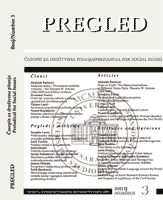Metodologija društvenog istraživanja između nauke i egzegeze zakonitosti građanskog društva
Methodology of Social Research between Science and Exegesis of Legitimacy of the Civil Society
Author(s): Šefik BarakovićSubject(s): Social Sciences
Published by: Univerzitet u Sarajevu
Keywords: scientific research; scientific theory; methodology; civil society; exegesis; theory; exegesis of legality of the civil society; axiom; social science; truth
Summary/Abstract: The methodology of social research, as a comprehensive scientific, philosophical and theoretical discipline, focuses on issues and problems of the society. It includes structural and functional components within the generic, historical and those potentially possible links, relationships and connections. This complexity of the social milieu is structured and constituted by numerous agents whose position and role is researched, assessed and analyzed by individual scientific social disciplines. Furthermore, for certain scientific social disciplines to succeed in their legitimacy, to justify their raison d´être, they are, through their fields of interest, directed towards each other, and support and condition each other with their scientific results. The range of areas of interest of social disciplines determines the range of points of contact and intertwining of similar methodological concepts; similarity leads to the achievement of scientific aims and constants in singularity, which in turn sets the aggregate of axioms in the process of balancing the subjects, methods and goals of research within those individual disciplines, based on which the space of unity of discovery and the substance of truth is created. Results of scientific research are established by axioms. Exegesis, as a process focusing on theoretical generalization, is crucially characterized by interest in the field of assumptions and critical persistence in inconsistency, by adequate justification of the given according to the concept that “everything given is also real”, by the creation of a basis for the extraction and creation of cases, orchestrated situations, by the conjuring up and creation of either optimism or pessimism depending on the situation, and sometimes exegesis supports positions that reality is a product of nature and an act of objective power, superior determinism, which through preference can emerge as absolute and can be portrayed as an absolute subject under the created conditions. A camera obscura approach cannot be in the function or determine the life-giving unity! It is in the function of a restrained system of civil political and ideological relations, these relations provide its measures, forms of expression, justification, absorption, while exegesis from the legitimacy of the civil society supports, aids and facilitates those relations.
Journal: PREGLED - časopis za društvena pitanja
- Issue Year: L/2009
- Issue No: 3
- Page Range: 215-251
- Page Count: 37
- Language: Bosnian

